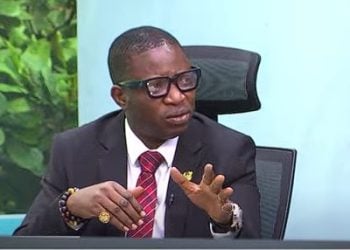The Ablekuma North Constituency in Ghana finds itself in a political stalemate seven months after the December 7th parliamentary elections, with no declared winner and accusations of electoral malpractice flying between the two major parties. The heart of the dispute lies in the yet-to-be-officially collated results, mired in controversy and allegations of manipulation. The National Democratic Congress (NDC) has pointed fingers at the ruling New Patriotic Party (NPP), claiming they are attempting to rig the process in their favor.
Dr. Sofo Rashid Tanko-Computer, the NDC’s Deputy Director of Elections and IT, has been vocal in his criticism, accusing the NPP of attempting to influence the Electoral Commission (EC) with fabricated documentation. He emphasizes that the accepted procedure mandates the presentation of original pink sheets, with political parties receiving carbon copies, not scanned versions. Dr. Tanko questions the validity of scanned copies, citing electoral regulations that stipulate the use of carbon copies. He highlights the unusual situation where both the EC and political parties claim to have lost the original pink sheets, attributing the loss to violence that occurred on election day. This loss of original documentation has created an environment ripe for manipulation, fueling the NDC’s suspicions.
Further adding to the controversy is the claim by the Electoral Commission that the original pink sheets have been lost. This loss, coupled with assertions from political parties that they too have lost their carbon copies due to election-day violence, has created a vacuum of verifiable documentation. This absence of primary evidence has become a central point of contention, with the NDC arguing that it opens the door for manipulation and undermines the integrity of the electoral process. Dr. Tanko, who also heads the Ghana Investment Fund for Electronic Communications (GIFEC), has called for the arrest of NPP members he alleges are implicated in the manipulation attempts. He believes that holding those responsible accountable is crucial for restoring faith in the electoral system and ensuring a fair outcome for the Ablekuma North constituents.
The escalating tension surrounding the Ablekuma North election results led the Minority Caucus in Parliament to take direct action. On June 4, 2025, they marched from Parliament to the CID Headquarters to submit a petition to the Inspector General of Police. The petition urges the provision of adequate security for the Electoral Commission, enabling them to collate the outstanding results safely and accurately. This demonstration underscores the seriousness of the situation and the growing concern over the potential for further irregularities or violence should the impasse not be resolved quickly and transparently.
Despite the ongoing controversy and the Electoral Commission’s continued silence on the matter, the NDC maintains its demand for a rerun of the election in the disputed polling stations. Dr. Tanko firmly asserts that the EC cannot declare a winner without adhering to the proper procedures, which include a thorough and legitimate collation process. He reiterates the NDC’s position that a fresh election is the only way to guarantee a fair and credible outcome. The party’s unwavering stance on this issue reflects their deep-seated distrust of the current situation and their commitment to upholding the principles of democratic elections.
Dr. Tanko accuses the NPP of manufacturing results within their party offices, scanning these fabricated figures, and attempting to present them to the EC for validation. He pledges that the NDC will actively resist any attempt to declare results based on these suspect documents, refusing to accept what they consider a fraudulent outcome. This unwavering stance further intensifies the political standoff, with the future of Ablekuma North’s parliamentary representation hanging precariously in the balance. The situation highlights the fragility of democratic processes when trust in electoral institutions is eroded and the need for transparency and accountability in resolving electoral disputes.


